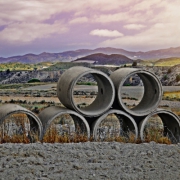The first LNG Market Maker – born when the world was not looking
For the longest time (about a decade or so) the LNG world was a certain place. The stuff itself was hard to get and expensive, sellers were courted at every whim and Asia paid steep premiums, which is why all efforts have been on this market plus some non-Asian exotics like Spain or Latin America.
Europe on the other side was a dead zone for LNG people, something to stay away from as it could not quite hope to reach those Asian high prices, and they had plenty of pipeline gas which was fighting over a contracting market for the last years of this long decade.
Any innovation coming to LNG – so was assumed – sure must have come from Asia as well and not from those sleepy Europeans. Except that – nothing could be further from the truth.
Because one of the most important, biggest jolts of innovation will come to the LNG industry out of the European continent. The first Market Maker.
A lot of hardcore energy folks will be asking – what’s a Market Maker? And with reason, as this term comes from the “non-physical”, financial trading world where every single deal can be settled with money.
The financial world has the advantage that it’s virtual, which means that they will never have to bother with moving real stuff to and from the counterpart of your dealings as is the case in the real world – where things are inherently messy.
Let’s drill the term now.
Straight from Investopedia:
Quote
A market maker is a broker-dealer firm that accepts the risk of holding a certain number of shares of a particular security in order to facilitate trading in that security. Each market maker competes for customer order flow by displaying buy and sell quotations for a guaranteed number of shares. Once an order is received, the market maker immediately sells from its own inventory or seeks an offsetting order. This process takes place in mere seconds. BREAKING DOWN 'Market Maker' The Nasdaq is the prime example of an operation of market makers. There are more than 500 member firms that act as Nasdaq market makers, keeping the financial markets running efficiently because they are willing to quote both bid and offer prices for an asset.
Unquote
In simple words, the market maker makes sure that you, a simple market participant, will always be able to buy when you want at a price that you can determine on the market and that you can always sell when you want at a price that’s determinable on the market as well. The market maker simply makes sure that you will never face a situation when you cannot get rid of your stuff or get hold of it. The market maker makes sure that it’s never a question of fundamental availability but rather always a question of price.
If you are willing to pay the market price, the market maker will always sell you. If you are happy to sell at the market price, the market maker will take this off your hands. Guaranteed.
This is of course much harder if you deal with something real rather than something virtual. Company stock, bonds, and derivatives are all virtual. They are merely ideas, symbolized by some electronic sparks. Transferring this thing is quick, painless, and can be done with no risk. Something physical is much messier as you have to make sure that you do get what you paid for or that you are going to deliver what you promised.
Virtual goods are what they are. Their qualities are inherent as they are ideas. They transfer as-is.
If you need a certain quality of LNG and it matters if this LNG is physically available at a certain moment at a certain time, then settling your open position financially as the LNG cannot be delivered as specified is not easy. There is more than money at stake as lights might go out. This is what you pay for – a precisely defined quality of LNG at a certain time at a certain location. It really must be there and someone must get it there.
That’s messy – but not so messy to the point of making it impossible. It’s simply a problem you need to take care of. This, of course, makes the market maker position much more difficult than in a purely financial world. It’s not just money that’s on the line but there needs to be infrastructure in place that limits the Market Maker position to some very precise locations on earth.
And the one that pops out is North Western Europe. You simply cannot put what exists there into existence by some top-down decision from some anointed authority – well at least not if the requisite conditions have not been met to a certain minimum threshold beforehand.
How would Qatar always “potentially buy” when the only thing they really can do is sell? How would Singapore take an additional cargo of LNG when their tanks are full and their tiny pipeline distribution system would pop the cork if there is just one more molecule of gas in it? The same is true for all the other wannabes.
They think that putting in place some slick, top-down price determination mechanism for spots is all they need to be the LNG hub. In reality, it needs Market Makers as there is not much of a market without the one (or those) who shoulder the responsibility of clearing positions when this is required.
A real market – that deserves the name – is a bottom-up affair that grows out of real needs, requirements, desires, hardship, dreams, shattered dreams, the chase for profits of countless participants, not some fat cats that are looking for just another toy to play with.
Europe has been hit by the LNG juggernaut now without any prior superior design with exactly this objective in mind. They were bystanders so far – in other words, it flew into their faces. There can be no doubt that later they will do all they can to kick and squeeze this opportunity as it lies on their feet. It will sure take some time for the players to decipher the clues but it will happen – don’t make a mistake here.
NBP was a byproduct of balancing gas flows in the gas grid – a mathematical function not even designed for trade but those crafty traders found it fitting for their activities. So will they figure out how to put those surplus volumes of LNG, those empty terminals in NWE, those huge pipeline gas markets in the hinterland with pretty liquid hubs in it, those storage facilities and myriad other little nitpicks to good use and make some cash on the flexi services they can offer to the LNG world while no one else can. This is then a de facto market maker.
The shale revolution in the US was kicked into high gear by little nut-bag drillers, not by some policy wonks. Real markets are free, unbridled, messy, chaotic, fun, and exciting, and they abhor the ivory tower thinker, but they love the sticks and stones tinkerer.
A market maker provides flexibility and swallows risk. Neither Qatar nor Singapore nor anyone else in Asia can do that.
That’s what North Western Europe can do best – for a price.


















A good explanation, keep up the good work!
Thanks Nicholas, I appreciate a lot